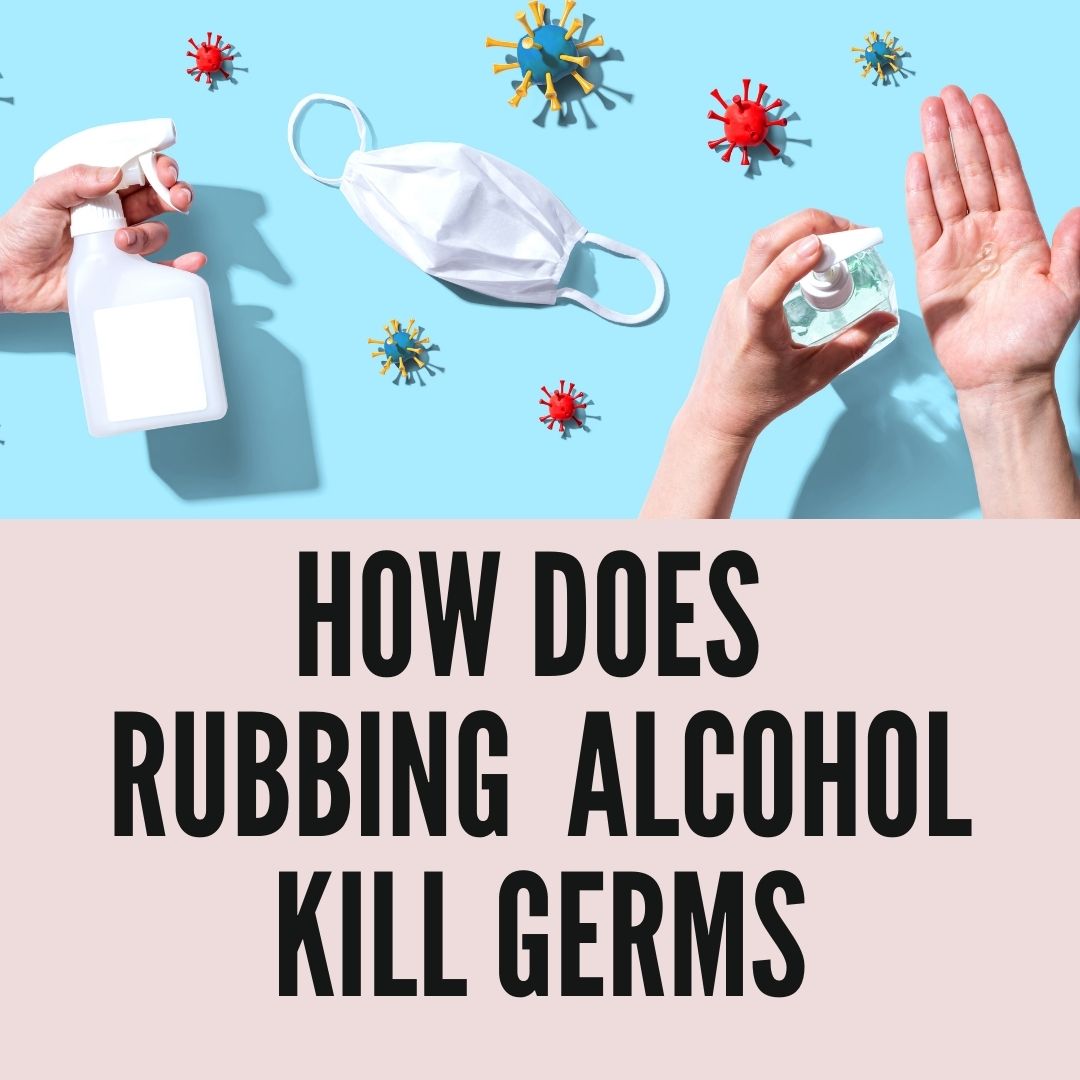
Alcohol has been one of the commonly used disinfectants for centuries. Even when commercialized products were not seen, Alcohol worked for killing all the local germs present around.
And from then till the outburst and pandemic of Nobel Coronavirus, no other solvent was made to replace Alcohol when it comes to disinfecting.
But do you know How does Alcohol kills Bacteria and Viruses? Wondering? Here’s all that you should know about the same.
How quickly does Isopropyl Alcohol kill the virus?
Can Alcohol kill germs? For all those who are wondering whether Isopropyl Alcohol has the potential to kill germs and viruses, the answer is Yes.
Isopropyl Alcohol is a form of Rubbing Alcohol. It kills germs and viruses through a simple chemical process known as Denaturation.
Denaturation is a process that involves the breaking of many of the weak linkages and bonds inside a protein molecule.
In terms of bacteria and viruses, Isopropyl breaks down the proteins present in the structure of germs canceling down the functioning of its cell. This further makes them lose their membrane protection and moisture, which leads to ultimate death.
When it comes to disinfecting, Isopropyl Alcohol is a handy solution in hospitals, clean rooms, and pharmaceutics.
Here’s a little more detail about bacterial structure and Denaturation:
The Bacterial Structure
Bacteria are made up of proteins that are composed of a chain of nearly 20 amino acids linked and curled together.
This link of amino acids results in unique shapes which are tough and important proteins that help bacteria function properly.
On the other hand, when suspended in a water-based cytoplasm while surrounded by a membrane composed of water molecules and fats, these proteins perform as workhorses of the bacterial cell.
These proteins allow cell-reproduction and let bacteria move. It ultimately keeps the bacteria safe from white blood cells in the human body. In short, these proteins are the central nervous system of bacteria, and without them, they will die.
Denaturation and how it causes the death of Bacteria
When bacteria come in contact with Isopropyl or other disinfecting Alcohol, the amphiphile Alcohol molecules pair with molecules of the bacterial cell membrane.
This results in making the bacteria more water-soluble. It further loosens up the cell membrane resulting in them falling apart.
Further, more and more Alcohol molecules enter the cell and begin to dissolve the protein, the process of which is known as Denaturation.
And because viruses and Bacteria cannot survive without their protein, they quickly dry up and die.
What concentration of Alcohol kills Bacteria?
As long as you are using the right percentage of the solution, Alcohol will kill all the common viruses.
According to experts, a concentration of 60 percent to 90 percent of Alcohol can kill a broad range of viruses.
However, once the Alcohol concentration drops below 50 percent, its usefulness for killing bacteria also drops.
How quickly does Isopropyl Alcohol kill the virus?
Isopropyl Alcohol is a fast killer when it comes to killing bacteria and viruses.
Isopropyl can take 30 seconds to 1 minute or sometimes a little more for eliminating viruses.
For example, While using a hand sanitizer or Alcohol-based hand wash, it is advisable to use it for 30 seconds.
Whereas while using Isopropyl Alcohol disinfectant over home surfaces, taking 60 seconds at least is advisable.
Why 70% of Alcohol is used for sterilization?
Even though when there are stronger Alcohol concentrations available, 70% Alcohol is more commonly used for sterilization.
It is because 70% of Alcohol is more effective in the process of sterilization and disinfection.
For a thumb rule, the higher the percentage of Alcohol, the lesser effective disinfecting and sterilizing.
It is because when we use 99% or 91% Alcohol on bacteria it causes an external injury that allows the organism to form a protective wall and shield itself.
Also, because a stronger concentration of Alcohol will evaporate very quickly, it gets no time to penetrate and kill bacteria.
(Simply, a higher concentration of Alcohol breaks down the outside of the cell even before it penetrates the pathogen.)
However, 70% of Alcohol can effectively cross over the cell membrane, attack the membrane and kill bacteria.
70% of Alcohol is also water-based; thus, it evaporates slowly, taking enough time to kill the bacteria.
Does Alcohol kill bacteria in the mouth?
Yes, Alcohol being a powerful disinfectant, can kill all bacteria with which it comes in contact. However, killing the good bacteria in your mouth can also hamper your dental health.
Our mouth has a number of good bacteria that help in fighting bad bacteria. If any solution or process eliminates the good bacteria, it leaves your gum and teeth vulnerable to infection.
That is why after drinking Alcohol, one must chew sugar-free gums. It will promote saliva formation inside the mouth and protect both teeth and gums.
Brushing teeth or drinking a lot of water after consuming Alcohol also helps in protecting oral health.
Does Alcohol kill bacteria in the throat?
No, when it comes to killing bacteria in the throat, Alcohol behaves as an ineffective solvent. There are very few or almost no traces of Alcohol combating cold or flu viruses.
Also, while someone is on medication for a throat-related infection, he/she must stay away from Alcohol.
It is because consuming Alcohol can conflict with medicinal drugs leading to serious health complications.
Does Alcohol kill bacteria in the stomach?
The human gut is home to more than 100 trillion bacteria, of which a lot are inside the stomach.
These bacteria aren’t harmful but important for maintaining gut health and overall wellbeing. But does consuming Alcohol show any impact on these bacteria?
Yes, Consuming Alcohol shows a harmful effect on bacteria in the stomach as well as the entire gut. Though it may kill a few bad bacteria inside your stomach, it will also damage the gut lining.
Also, when an individual consumes Alcohol in higher concentration, greater and immediate damage is quickly visible.
CAUTION: When it comes to any internal usage, Alcohol refers to Consuming Alcohol only. Under no circumstance are we talking about Rubbing Alcohol for internal usage? Instead, we strongly discourage using Rubbing Alcohol for consuming, inhaling, or treating open body wounds and tracks.
For Further Reading
- Will Rubbing Alcohol Kills Bed Bugs?
- Will Rubbing Alcohol Kill Plants?
- Does Rubbing Alcohol Kill Mold?
- Does Rubbing Alcohol Kill Lice?
Wrapping up…
If the Alcohol concentration is greater than 60%, it will effectively kill common viruses and bacteria. For killing germs with Isopropyl, you can either use the dedicated solvent or Alcohol-based hand sanitizers.
While you are using it in the human body, simply rub Isopropyl or Sanitizer for 30 seconds. You can either follow it with a cold-water wash or leave it alike as Alcohol/Sanitizer will evaporate within no time.
Whereas while using on surfaces, take a microfibre cloth, pour in some Isopropyl, and wipe using it for 60 seconds. However, avoid using it over treated wood and leather.

My name is Logan, and I’m a 36-year-old dad who owns a small pressure-washing company in the suburbs of Atlanta, Georgia. My main goal with rubbing-alcohol.com is to show you how versatile isopropyl rubbing alcohol can be! I hope. You find it useful.
